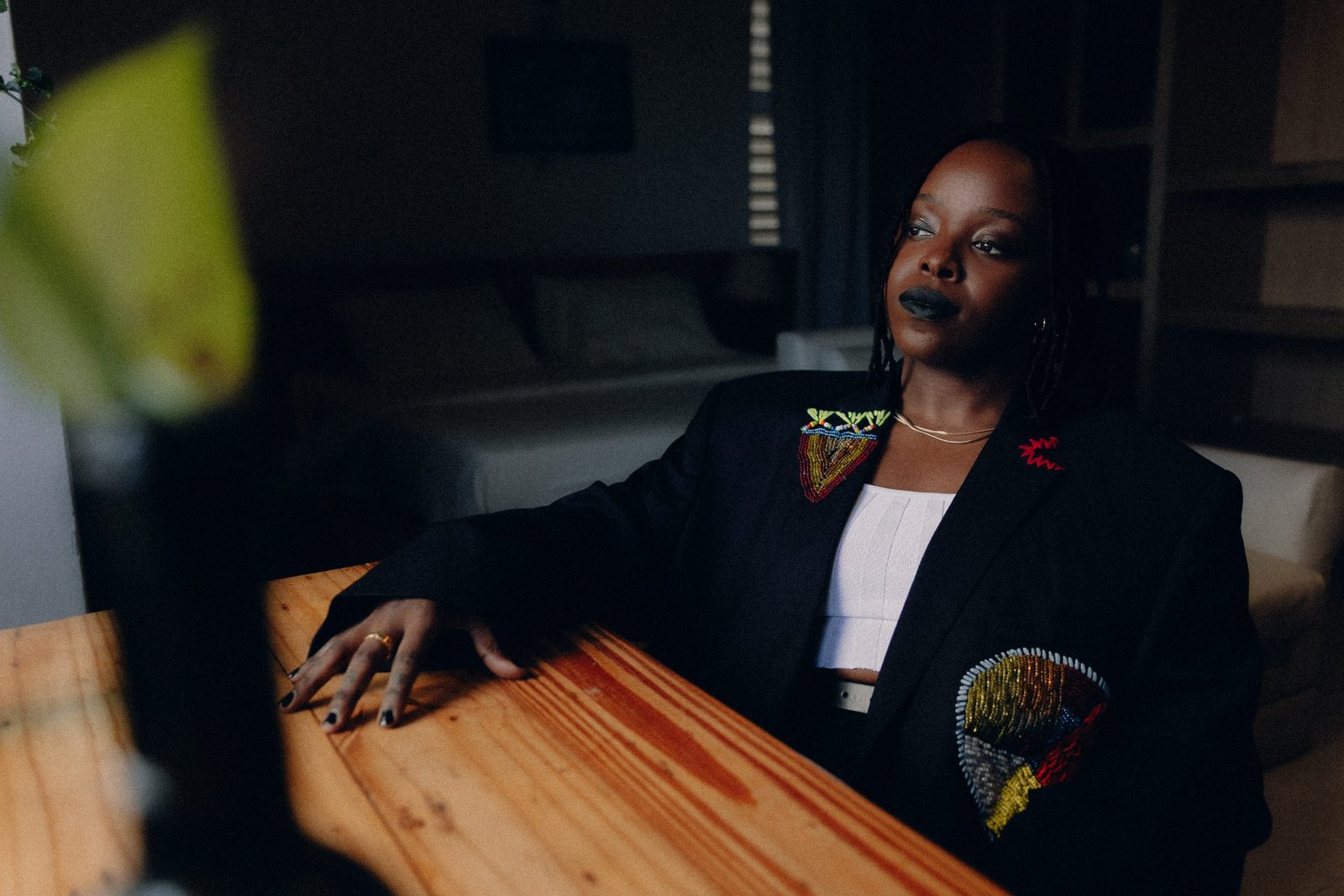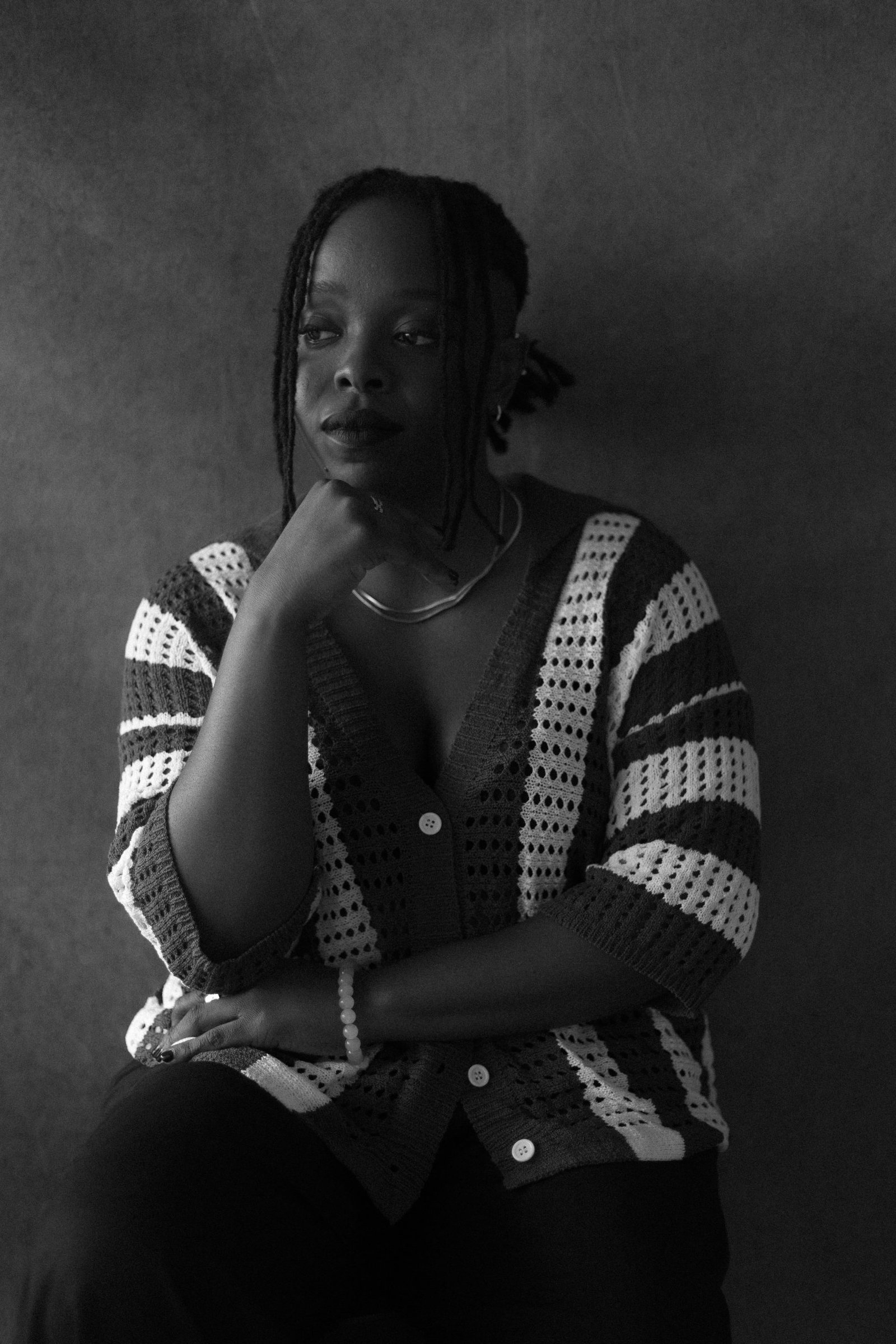
Joyce Olong Does It All — And Makes Magic Doing It
When you sit with Joyce Olong, you’re not just in conversation — you’re in communion with a creative spirit deeply attuned to her calling. A singer, songwriter, and producer with a journey rich in intentionality, Joyce is one of the few who not only wears many hats but glides effortlessly in each.
From the very start of our chat for The Book, it was clear that Joyce is not just here to make music — she’s here to walk in her purpose. She described discovering her gift at the tender age of seven. “I think I knew very early on that this was my gift… from seven, that’s when I was, like, sure that music is my way.” That conviction has never wavered, even when life presented tests that seemed crafted to break her resolve.
Born into a household where music of every kind echoed from room to room — from Gregorian chants to Whitney Houston, from Makossa to Lebanese pop — her sonic palette is broad and bold. That fusion of sounds is not just nostalgia. It’s alchemy. “It was a real mess of amazing music,” she recalls, laughing. But it’s clear: that “mess” was magic.
Producer First, Singer Always Becoming
Interestingly, Joyce’s entry into music didn’t begin with her voice — it began with instruments. Piano. Saxophone. Rhythm. She was always curious about what made a song a song, even before she knew how to carry a note. “I actually didn’t start off singing. I started off just playing the piano… I wasn’t really a good singer,” she admits with a chuckle.
But then came a turning point — witnessing two girls named Joyce and Phoebe perform at a music competition. It lit a fire in her. “I was like, how did you do that?” That awe turned into obsession, and she began teaching herself how to make her voice match the sound she heard in her head.
Soon after, Joyce became her own band and choir director — drafting her siblings into mini studio sessions. “I’ll make my siblings come to my room… you sing this alto part, you sing this soprano…” It wasn’t just play. It was training. It was vision.
Her love for production remains her most profound. “I liked the idea of music coming out of nothing… from your mind to piano and then computer, and all of a sudden there’s music. It was very cool for me.”
On Wearing Multiple Hats: Evolution Within Herself
For Joyce, the question of balancing creativity across roles doesn’t even apply. “For me, I like all the hats.”
“You’re not really spreading yourself thin… it’s the whole thing.” She believes artists should expand — sketch, paint, evolve. She’s fascinated by how different producers approach their process. “I found myself watching people make beats… trying to collect packs… some people be hoarding crack-level plugins!”
There’s joy in her curiosity. There’s purpose in her process. Whether she’s sketching a melody sparked by the strum of a guitar or pulling feelings out of thin air to lace into her lyrics, the creative process remains, to her, “just abracadabra. Tinkerbell stuff.”

Being Stubborn About Your Sound
When we talked about staying true to her artistry in an industry that often prizes trends, commercial appeal over the truth of your artistry, Joyce got real. “You have to be stubborn… somebody has to say, ‘ah, she’s difficult to work with.’ That’s why you’re doing the right thing.” She likens the industry to a game — and artists, to birds. “You can be a crane, be a flamingo… a nice bird that just does their own thing.” She advises to always keep something for yourself but not always be too attached to your work.
That self-awareness leads her to approach music with care and detachment. “You love her when you let her go,” she says, referring to the art of releasing music. She knows that sometimes the songs she creates may not fit in — but that doesn’t mean they don’t belong.
On Safe Spaces and Sisterhood
As a woman in a male-dominated industry, Joyce acknowledges the power of community. She spoke fondly of a recent music camp with Dami Oniru — a space for female producers, musicians, and writers. There was yoga. There was mindfulness. But most importantly, there was music — unfiltered, unfettered.
“Make friends, do your part, and go home,” she advised. “Always go where you are invited. Don’t loiter.” It was both humorous and sobering — a reflection of navigating an industry that often doesn’t create enough room for women to simply be.
That One Moment
One of Joyce’s most vulnerable revelations was about losing an entire project — not once, but thrice, this was in 2021/2022. “My laptop, my hard drives, my Google Drive… gone. Like, how did you get there?” But instead of letting it break her, she saw it as divine redirection. “Losing music made me want to push harder… giving up on music is like giving up on myself.”
It’s clear that every loss, every silence, every glitch in the system has only fortified her purpose. It was at this point she decided she cannot give up on music. “You don’t give up until you are done.”
Making Comfort Music
She reflected on how she was very conscious of what type of music she made but now she is more herself, “more daring, courageous – I prayed for this.”
On new emotions in her music, she highlighted that she earlier used to communicate problems and where she was but in Joyce’s latest project — an 8-song live EP — is an intentional pivot. “I want to convey comfort and luxury.” It’s a shift from pain to peace, from chaos to clarity. She’s not trying to rush listeners. She’s inviting them to pace life with her music.
The producer in her is also seeking growth. She’s already thinking about her next soundscape — something unlike what she just released. “I brought out my R&B, my ambient… now I want to do something different, to improve my skills.”
Looking Ahead: A Future of Service and Sound
Five years from now, Joyce hopes to be both an artist and an enabler of greatness. “I want to help others be great, be of good service… I just pray God blesses me with enough resources to bless other people with.”
In a world obsessed with metrics, Joyce is championing something deeper — community, care, and creativity. She warns against a numbers-first approach in African music. “Respect your consumers. We need better structures. If there’s structure, we’re good to go.”
She talked about how we are a good source as a people and as an Industry and with the right structure we would be limitless.
The Feminine Touch in Production
As a female producer, Joyce believes women bring a unique sensitivity to sound. “It’s like we hear things differently, feel it differently.” She recounts a session with Keziah Mallam and GBots “It started as a jazz beat… it became Afro jazz… it had a pink touch. Finesse.”
Her takeaway? “We need more ladies in the space producing. There’s a touch — a touch I like.”
If Her Music Was a Message in a Bottle…
To future generations, Joyce Olong would say, “Speak life. Manifest your future.” Her music is a vessel for belief, a call to faith. “I want my music to make people believe. Believe. Have faith.”
And with that, the conversation — the communion — ends, not with a goodbye, but a benediction.
Interview conducted and written by Andrea Andy.
